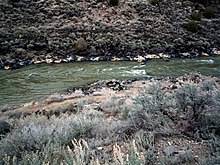
Pagosa Springs is a home rule municipality that is the county seat, the most populous community, and the only incorporated municipality in Archuleta County, Colorado, United States. The population was 1,571 at the 2020 census. Approximately 65 percent of the land in Archuleta County is either San Juan National Forest, Weminuche and South San Juan wilderness areas, or Southern Ute Indian reservation land.

Ash Springs is an unincorporated community in the Pahranagat Valley of Lincoln County, Nevada. The community's principal industry is ranching. Ash Springs is named for the desert ash trees growing nearby.

The Rio Grande Gorge is a geological feature in northern New Mexico where the watercourse of the Rio Grande follows a tectonic chasm. Beginning near the Colorado border, the approximately 50-mile (80 km) gorge runs from northwest to southwest of Taos, New Mexico, through the basalt flows of the Taos Plateau volcanic field. The gorge depth is 800 feet (240 m) just south of the Rio Grande Gorge Bridge, which spans the gorge 10 miles (16 km) northwest of Taos.
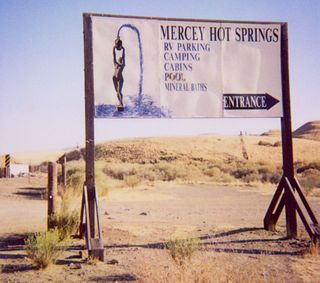
Mercey Hot Springs is an unincorporated community and historical hot springs resort in the Little Panoche Valley of Fresno County, central California, about 60 miles (97 km) west-southwest of Fresno.
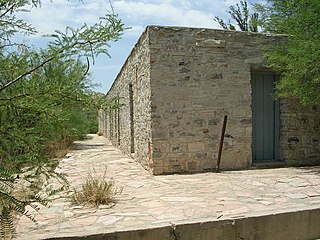
Hot Springs, also known as Boquillas Hot Springs, and Langford Hot Springs is a former thermal spring resort in what is now Big Bend National Park in Texas. Hot Springs was placed on the National Register of Historic Places in 1974.

The Rio Grande del Norte National Monument is an approximately 242,555-acre (98,159 ha) area of public lands in Taos County, New Mexico, United States, proclaimed as a national monument on March 25, 2013, by President Barack Obama under the provisions of the Antiquities Act. It consists of the Rio Grande Gorge and surrounding lands, managed by the Bureau of Land Management (BLM).
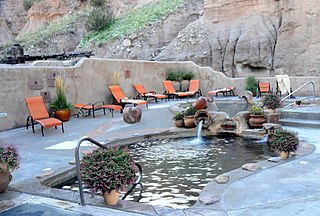
Ojo Caliente Hot Springs is a group of thermal springs located in Taos County, New Mexico, United States. They are also known as the Ojo Caliente Mineral Springs. These hot springs were used by native New Mexicans for many years. In the late 19th century the springs began to be developed for therapeutic use for several ailments, including tuberculosis.

Pagosa hot springs is a hot spring system located in the San Juan Basin of Archuleta County, Colorado. The town of Pagosa Springs claim they are the world's deepest known geothermal hot springs.
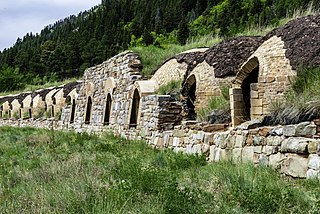
Penny Hot Springs is a geothermal spring located near the historic mining town of Redstone, Colorado.

Crystal Springs hot springs is a system of geothermal springs and seeps near Ash Springs, located at the site of a ghost town, Crystal Springs, Nevada. Several marshes and springs are located along the White River.

Soldier Meadows hot spring system is a group of hot and warm springs near the town of Gerlach, Nevada.

Montezuma Hot Springs, also known as Las Vegas Hot Springs, are a grouping of 20-to-30 thermal springs in the Montezuma unincorporated community of San Miguel County, near the town of Las Vegas, New Mexico.

Jordan Hot Springs is series of thermal mineral springs located in the Golden Trout Wilderness, Inyo National Forest, California.
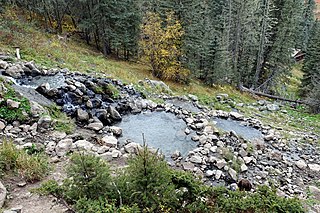
San Antonio Hot Springs are a group of geothermal springs located in the Santa Fe National Forest in Northern New Mexico.
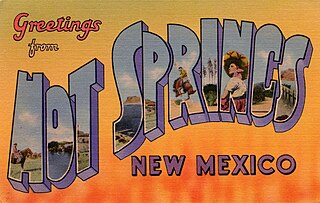
Truth or Consequences Hot Springs is a thermal spring system located in the Hot Springs Artesian Basin area of Truth or Consequences, New Mexico in Sierra County.
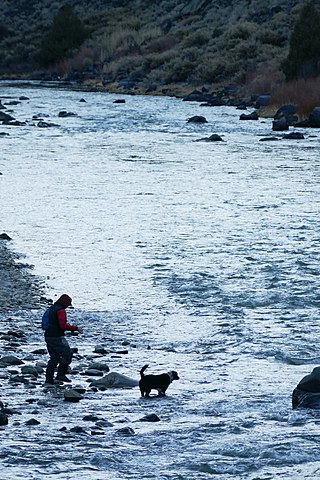
Black Rock Hot Springs are a small system of thermal springs west of the town of Arroyo Hondo, New Mexico.

Yunomine Onsen is a hot spring system and resort town in Tanabe, near Hongu Town in southern Wakayama Prefecture, Japan. The Tsuboyu bath is located there, a UNESCO World Heritage site.
Hot Well Dunes is a hot spring in the San Simeon Valley of Arizona, located on BLM land southeast of the town of Safford.
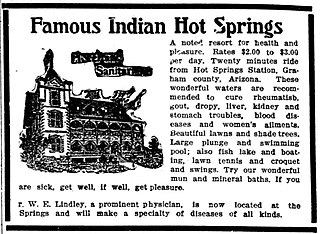
Indian Hot Springs, also known as Holladay Hot Springs and Eden Hot Springs, is a geothermal spring system located near Eden, Arizona in the former settlement of Indian Hot Springs, Arizona. The springs have also been referred to as "Jewel in the Desert" and Indian Hot Springs at Eden.

Radium Hot Springs is a thermal mineral spring near the small town of Radium, Colorado, located halfway between Kremmling and State Bridge, in Grand County, Colorado.


